英语专四完形填空模拟练习题.
英语专业四级完形填空模拟训练精编版20篇
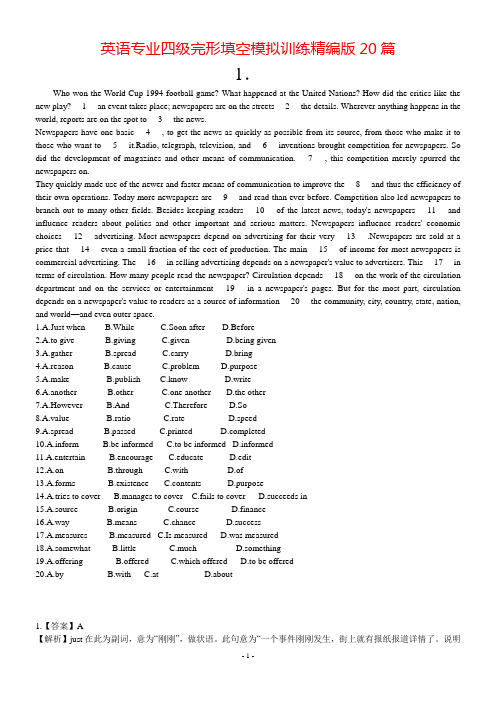
1.Who won the World Cup 1994 football game? What happened at the United Nations? How did the critics like the new play? __1__ an event takes place; newspapers are on the streets __2__ the details. Wherever anything happens in the world, reports are on the spot to __3__ the news.Newspapers have one basic __4__ , to get the news as quickly as possible from its source, from those who make it to those who want to __5__ it.Radio, telegraph, television, and __6__ inventions brought competition for newspapers. So did the development of magazines and other means of communication. __7__ , this competition merely spurred the newspapers on.They quickly made use of the newer and faster means of communication to improve the __8__ and thus the efficiency of their own operations. Today more newspapers are __9__ and read than ever before. Competition also led newspapers to branch out to many other fields. Besides keeping readers __10__ of the latest news, today's newspapers __11__ and influence readers about politics and other important and serious matters. Newspapers influence readers' economic choices __12__ advertising. Most newspapers depend on advertising for their very __13__ .Newspapers are sold at a price that __14__ even a small fraction of the cost of production. The main __15__ of income for most newspapers is commercial advertising. The __16__ in selling advertising depends on a newspaper's value to advertisers. This __17__ in terms of circulation. How many people read the newspaper? Circulation depends __18__ on the work of the circulation department and on the services or entertainment __19__ in a newspaper's pages. But for the most part, circulation depends on a newspaper's value to readers as a source of information __20__ the community, city, country, state, nation, and world—and even outer space.1.A.Just when B.While C.Soon after D.Before2.A.to give B.giving C.given D.being given3.A.gather B.spread C.carry D.bring4.A.reason B.cause C.problem D.purpose5.A.make B.publish C.know D.write6.A.another B.other C.one another D.the other7.A.However B.And C.Therefore D.So8.A.value B.ratio C.rate D.speed9.A.spread B.passed C.printed pletedrm B.be informed C.to be informed rmed11.A.entertain B.encourage cate D.edit12.A.on B.through C.with D.of13.A.forms B.existence C.contents D.purpose14.A.tries to cover B.manages to cover C.fails to cover D.succeeds in15.A.source B.origin C.course D.finance16.A.way B.means C.chance D.success17.A.measures B.measured C.Is measured D.was measured18.A.somewhat B.little C.much D.something19.A.offering B.offered C.which offered D.to be offered20.A.by B.with C.at D.about1.【答案】A【解析】just在此为副词,意为“刚刚”,做状语。
英语专四完形填空新题型十套(附答案)
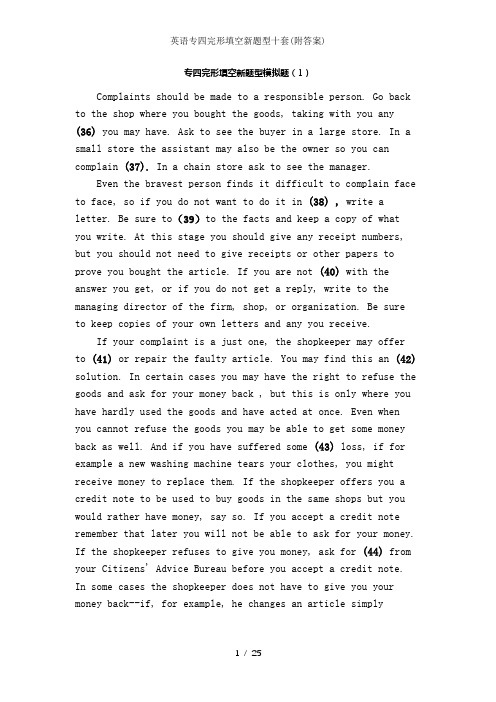
专四完形填空新题型模拟题(1)Complaints should be made to a responsible person. Go back to the shop where you bought the goods, taking with you any (36) you may have. Ask to see the buyer in a large store. In a small store the assistant may also be the owner so you can complain (37). In a chain store ask to see the manager.Even the bravest person finds it difficult to complain face to face, so if you do not want to do it in (38) , write a letter. Be sure to(39)to the facts and keep a copy of what you write. At this stage you should give any receipt numbers, but you should not need to give receipts or other papers to prove you bought the article. If you are not (40) with the answer you get, or if you do not get a reply, write to the managing director of the firm, shop, or organization. Be sureto keep copies of your own letters and any you receive.If your complaint is a just one, the shopkeeper may offerto (41) or repair the faulty article. You may find this an (42) solution. In certain cases you may have the right to refuse the goods and ask for your money back , but this is only where you have hardly used the goods and have acted at once. Even when you cannot refuse the goods you may be able to get some money back as well. And if you have suffered some (43) loss, if for example a new washing machine tears your clothes, you might receive money to replace them. If the shopkeeper offers you a credit note to be used to buy goods in the same shops but you would rather have money, say so. If you accept a credit note remember that later you will not be able to ask for your money. If the shopkeeper refuses to give you money, ask for (44) from your Citizens' Advice Bureau before you accept a credit note.In some cases the shopkeeper does not have to give you your money back--if, for example, he changes an article simplybecause you don't like it or it does not fit. He does not hive to take back the goods in these (45).A. intimateB. attractiveC. personD. attachmentE. satisfiedF. receiptG. contaminateH. replaceI. special J. stick K.vigorously L. adviceM. circumstances N. directly O. petitions专四完形填空新题型模拟题(2)Culture is the sum total of all the traditions, customs, beliefs, and ways of life of a given group of human beings. In this (36), every group has a culture, however savage, undeveloped, or uncivilized it may seem to us.To the professional anthropologist (人类学家), there is no intrinsic(37)of one culture over another, just as to the professional linguist there is no intrinsic hierarchy(等级制度) among languages.People once thought of the languages of backward groups as (38) and undeveloped forms of speech, consisting largely of grunts and groans. While it is possible that language in general began as a series of grunts and groans, it is a fact established by the study of "backward" languages that no spoken tongue answers that description today. Most languages of uncivilized groups are, by our most severe standards, extremely complex, delicate, and ingenious pieces of machinery for the (39) of ideas. They fall behind our Western languages not in their sound patterns or (40 ) structures, which usually are fully adequate for all language needs, but only in their vocabularies, which(41)the objects and activities known to their speakers. Even in this department, however, two thingsare to be noted: 1. All languages seem to (42) the machineryfor vocabulary expansion, either by putting together words already in existence or by borrowing them from other languages and adapting them to their own system. 2. The objects and activities requiring names and distinctions in "backward" languages, while different from ours, are often surprisingly (43) and complicated.This study of language, in turn, (44) a new light upon the claim of the anthropologists that all cultures are to be viewed(45), and without ideas of rank or hierarchy.A. savageB. superiorityC. conceiveD. transferE. identificationF. grammaticalG. reflectH. revealsI. numerous J . independentlyK. exclusive L. casts M. sense N. confidentially O. possess专四完形填空新题型模拟题(3)In the second half of the twentieth century, many countries of the South began to send students to the industrialized countries for further education. They (36) needed supplies of highly trained personnel to (37) a concept of development based on modernization. But many of these students decided to stay on in the developed countries when they had finished their training.In the 1960s, some Latin American countries tried to solve this problem by setting up special "return" programs to encourage their professionals to come back home. These programs received support from international bodies such as the International Organization for Migration, which in 1974enabled over 1,600(38)scientists and technicians to return to Latin America.In the 1980s and 1990s, "temporary return" programs were set up in order to make the best use of trained personnel (39) strategic positions in the developed countries. This gave rise to the United Nations Development Program's Transfer of Knowledge through Expatriate Nationals, which encourages technicians and scientists to work in their own countries for short periods. But the brain drain from these countries maywell increase in (40) to the new laws of the international market in knowledge.Recent studies (41) that the most developed countries are going to need more and more highly qualified professionals around twice as many as their educational systems will be ableto produce, or so it is thought. As a (42) there is an urgent need for developing countries which send students abroad to give (43) to fields where they need competent people to give muscle to their own institutions, instead of encouraging the training of people who may not come back because there are no professional outlets for them. And the countries of the South must not be content with institutional structures that simply take back professionals sent abroad; they must introduce (44) administrative procedures to encourage them to return. If they do not do this, the brain drain is (45) to continue.A. forecastB. flexibleC. neutrallyD. preferenceE. detachF. boundG. implementH. consequenceI. qualifiedJ. dismissingK. result L.occupying M. urgently N . skepticalO . response专四完形填空新题型模拟题(4)Complaints should be made to a responsible person. Go back to the shop where you bought the goods, taking with you any (36) you may have. Ask to see the buyer in a large store. In a small store the assistant may also be the owner so you can complain (37). In a chain store ask to see the manager.Even the bravest person finds it difficult to complain face to face, so if you do not want to do it in (38), write a letter. Be sure to(39)to the facts and keep a copy of whatyou write. At this stage you should give any receipt numbers, but you should not need to give receipts or other papers to prove you bought the article. If you are not (40) with the answer you get, or if you do not get a reply, write to the managing director of the firm, shop, or organization. Be sure to keep copies of your own letters and any you receive.If your complaint is a just one, the shopkeeper may offer to (41) or repair the faulty article. You may find this an (42) solution. In certain cases you may have the right to refuse the goods and ask for your money back, but this is only where you have hardly used the goods and have acted at once. Even when you cannot refuse the goods you may be able to get some money back as well. And if you have suffered some (43) loss, if for example a new washing machine tears your clothes, you might receive money to replace them. If the shopkeeper offers you a credit note to be used to buy goods in the same shops but you would rather have money, say so. If you accept a credit note remember that later you will not be able to ask for your money. If the shopkeeper refuses to give you money, ask for (44) from your Citizens' Advice Bureau before you accept a credit note. In some cases the shopkeeper does not have to give you your money back--if, for example, he changes an article simply because you don't like it or it does not fit. He does not hive to take back the goods in these (45).A. intimateB. attractiveC. personD. attachmentE. satisfiedF. receiptG. contaminateH. replaceI. special J. stick K.vigorously L. adviceM. circumstances N. directly O. petitions专四完形填空新题型模拟题(5)For many environmentalists, the world seems to be getting worse. They have developed a hitlist of our main fears: natural resources are(1)out the population is ever growing, leaving less and less to eat species are becoming (2)in vast numbers, and the planet's air and water are becoming ever more polluted.But a quick look at the facts shows a different picture. First, energy and other natural resources have become more(3) not less so, since the book 'The Limits to Growth' was published in 1972 by a group of scientists. Second, more foodis now produced per 4 of the world's population than at any time in history. Fewer people are (5) . Third, although species are indeed becoming extinct, only about 0.7% of them are expected to disappear in the next 50 years, not 25~50%, as has so often been(6). And finally, most forms of environmental pollution either appear to have been (7) , or are transient - associated with the early stages of industrialization and therefore best cured not by restricting economic growth, but by(8)it. One form of pollution - therelease of greenhouse gases that causes global warming - does appear to be a phenomenon that is going to extend well into our future, but its total impact is unlikely to(9) a devastating (令人心神不安的) problem. A bigger problem may well turn out to be an inappropriate response to it.Yet opinion polls suggest that many people nurture the belief that environmental standards are declining and some factors seem to cause this disjunction between (10) and reality.A) pose B) exaggerated C) acceleratingD) extinct E) exist F) perceptionG) wealthy H) magnified I) starvingJ) head K) running L) predictedM) abundantN) conceptionO) reducing专四完形填空新题型模拟题(6)During the nineteenth and twentieth centuries, migrations have taken place within (11) countries; the cities with their industries have attracted people away from the country. The possibility of earning a fixed (12) in a factory or office wasmore attractive than the possibility of staying on the farm and having one's work (13) by frost, storms, or droughts. Furthermore, thedevelopment of agricultural machinery made it possible for fewer people to do the same (14) of work.Thus, at the same time when the industrial revolution made it possible to produce goods more (15) and more quickly in factories, agricultural revolution also took place. Instead of leaving fields empty every third year, farmers began to plant clover or some other crop that would (16) the soil. Instead of using only animal fertilizer, farmers began to use chemical fertilizers to keep the soil rich. These methods have enabled French farmers, for example, to get five times as much wheat as was (17) from the same land two centuries ago.In many countries farmers find it more (18) to raise only one crop or one kind of animal. They choose the kind that gives the best results. Then they sell all that they produce, instead of trying to grow a little of everything and consume what they grow. This is a more feasible type of (19) because modern methods and machinery are adapted to specific animals and specific crops. Therefore, it would be too expensive to do allthe work by hand, or to buy the (20) needed for several different kinds of farming.A. salary E. deserted I. equivalent M. destroyedB. freely F. operation J. enrich N. certainC. profitable G.amount K. fruitful O. cheaplyD. obtained H. payment L. equipment专四完形填空新题型模拟题(7)Like most parents, geologist Brain Atwater worries about his daughter's safety. But these days, he has an unusual concern; The public school she (11) in Seattle has unreinforced brick walls, a (12) being easy to collapse during earthquakes. The same (13) of walls crushed hundreds of thousands of people during the 1976 Tangshan quake in China.A decade ago, Atwater would have paid little notice to schoolroom walls. But over the last several years, he and other scientists have found (14) signs that the Pacific Northwest hasexperienced giant quakes in the distant past and that the area may be headed for a destructive shock in the near future.At a meeting of the American Geophysical Union in December, researchers discussed the (15) uncovered evidence of quake potential in the Pacific Northwest. While some remain unconvinced that huge earthquakes—with magnitudes of 8 or higher—do indeed (16) this region, a growing number consider such shocks a serious possibility.What's worrisome, they say, is that northwestern cities such as Portland, Seattle and Vancouver have not prepared for earthquakes of this magnitude, which could shake the region's (17) centers with enough force to make the recent San Francisco area damage seem (18) in comparison."I think it's quite true to say that nothing has really been designed with one of these earthquakes in mind," says seismologist Paul Somerville of Woodward. At the meeting, Somerville and his colleagues (19) estimates of the degree of shaking. Portland and Seattle would suffer during such a (20) earthquake.A. massiveB.recentlyC.constructionD.displayedE. relativelyF.attendsG.typeH.strikeI. structure J.participates K.excessive dM. disturbing N.population 0.presented专四完形填空新题型模拟题(8)Growth of trade will depend greatly on availability of energy sources. There may still be a trillion barrels of recoverable oil in the Middle East. But the oil crisis of 1974 has (11) to renewed interest in coal and to a search for (12) sources of energy. Solar, geothermal, and nuclear energy will play a large role in the years to come.Solar energy is available in (13) forms. Buildings can be heated and cooled by direct use of solar radiation, crops and trees, which are the most efficient converters of sunlight into energy, can be grown for their energy potential, wastes can be burned as (14) , sunlight can be converted into DC (direct current) electricity, electric power can be (15) from thesun-warmed surface waters of the ocean, and lastly, solar radiation can be converted into heat that will drive electric power generators. Serious problems still remain as to (16)and storage of solar energy.Geothermal energy is the energy contained within the earth. Heat is abundantly available deep in the earth's core and is constantly being produced. However, this heat is usually located at too deep a level for (17) exploitation. In short, very little is known on the use of geothermal energy, and it has (18) been exploited.Nuclear energy is produced in nuclear power plants. At these plants atoms of uranium are split, thus (19) masses of energy. Another source of energyunder development is the nuclear fusion of certain atoms of hydrogen. This could eventually (20) natural gas as a source of energy.A. rarelyB.transformationC.fuelD.replaceE. ledF.alternativeG mercial H.briefly I. derivedJ.various K.relieving L.releasingM. transportation N.financial O.described专四完形填空新题型模拟题(9)The economy of the United States after 1952 was the economy of a well-fed, almost fully employed people. Despite (11)alarms, the country escaped any postwar depression and lived in a (12) of boom. An economic survey of the year 1955, atypical year of the 1950's, may be typical as (13) the rapid economic growth of the decade. The national output was (14)at 10 percent above that of 1954(1955 output was estimated at 392 billion dollars). The production of manufactures was about 40 percent more than it had (15) in the years immediately following World War I . The country's business spent about 30 billion dollars for new factories and machinery. National income (16) for spending was almost a third greater than it had been in 1950. Consumers spent about 256 billion dollars; that is about 700 million dollars a day, or about twenty-five million dollars every hour, all round the (17) . Sixty-five million people held jobs and only a little more than twomillion wanted jobs but could not find them. Only agriculture ( 18 )that it was not sharing in the boom. To some observers this was a sad reflection of the mid-1920's. As farmers' share of their products (19) , marketing costs rose. But there were, among the observers of the national economy, a few who were not as confident as the majority. Those few seemed to fearthat the boom could not last long and would(20) lead to the opposite—depression.A. eventuallyB.averagedC.graduallyD.stateE. valuedF.formG.declinedH.occasionalI. casual J.argued K.descended L plainedM. clock N.available O.illustrating专四完形填空新题型模拟题(10)Social customs and ways of behaving change. Things which were considered impolite many years ago are now (11) . Just a few years ago, it was (12) impolite behavior for a man to smoke on the street. No man who thought of himself as being a gentleman would make a (13) of himself by smoking when a lady was in a room.Customs also differ from country to country. Does a man walk on the left or the right of a woman in your country Or doesn't it (14) What about table manners Should you use bothhands when you are eating Should you leave one in your lap, or on the tableThe Americans and the British not only speak the same language but also (15) a large number of social customs. For example, in both America and England people shake hands when they meet each other for the first time. Also, most Englishmen will open a door for a woman or offer their seat to a woman, and so will most Americans. (16) is important both in England and in America. That is, if a dinner invitation is for 7o'clock, the dinner guest either arrives (17 ) to that time or calls up to explain his (18)The important thing to remember about social customs is not to do anything that might make other people feel uncomfortable— (19) if they are your guests. There is an old story about a man who gave a formal dinner party. When the food was served, one of the guests started to eat his peas with a knife. The other guests were amused or shocked, but the (20) calmly picked up his knife and began eating in the same way.A. especiallyB.attainableC.closeD.delayE. consideredF.hostG.deliveryH.PreparationI. share J.fool K.specifically L.acceptableM. matter N.Promptness 0.care答案与解析模拟题(1)36.F语法判断:分析句子结构可知,any后应接一个名词,且本句缺少一个名词作takin9的宾语。
专业英语四级(完形填空)模拟试卷60(题后含答案及解析)
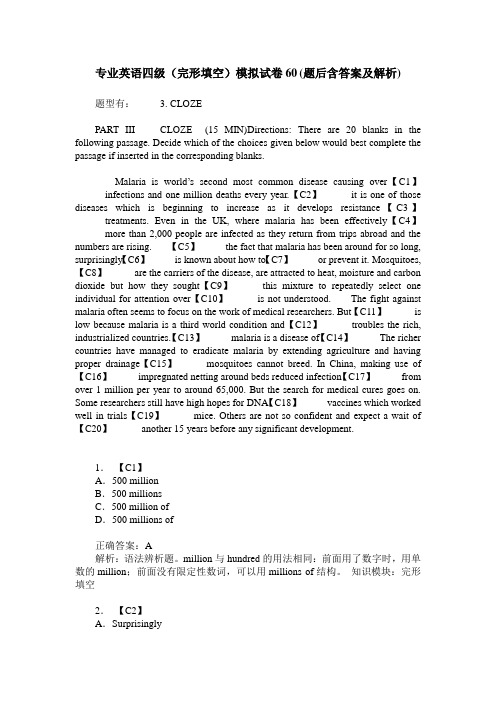
专业英语四级(完形填空)模拟试卷60(题后含答案及解析)题型有: 3. CLOZEPART III CLOZE (15 MIN)Directions: There are 20 blanks in the following passage. Decide which of the choices given below would best complete the passage if inserted in the corresponding blanks.Malaria is world’s second most common disease causing over【C1】______infections and one million deaths every year.【C2】______it is one of those diseases which is beginning to increase as it develops resistance【C3】______treatments. Even in the UK, where malaria has been effectively【C4】______more than 2,000 people are infected as they return from trips abroad and the numbers are rising. 【C5】______the fact that malaria has been around for so long, surprisingly【C6】______is known about how to【C7】______or prevent it. Mosquitoes,【C8】______are the carriers of the disease, are attracted to heat, moisture and carbon dioxide but how they sought【C9】______this mixture to repeatedly select one individual for attention over【C10】______is not understood. The fight against malaria often seems to focus on the work of medical researchers. But【C11】______is low because malaria is a third world condition and【C12】______troubles the rich, industrialized countries.【C13】______malaria is a disease of【C14】______The richer countries have managed to eradicate malaria by extending agriculture and having proper drainage【C15】______mosquitoes cannot breed. In China, making use of 【C16】______impregnated netting around beds reduced infection【C17】______from over 1 million per year to around 65,000. But the search for medical cures goes on. Some researchers still have high hopes for DNA【C18】______vaccines which worked well in trials【C19】______mice. Others are not so confident and expect a wait of 【C20】______another 15 years before any significant development.1.【C1】A.500 millionB.500 millionsC.500 million ofD.500 millions of正确答案:A解析:语法辨析题。
专业英语四级(完形填空)模拟试卷110(题后含答案及解析)
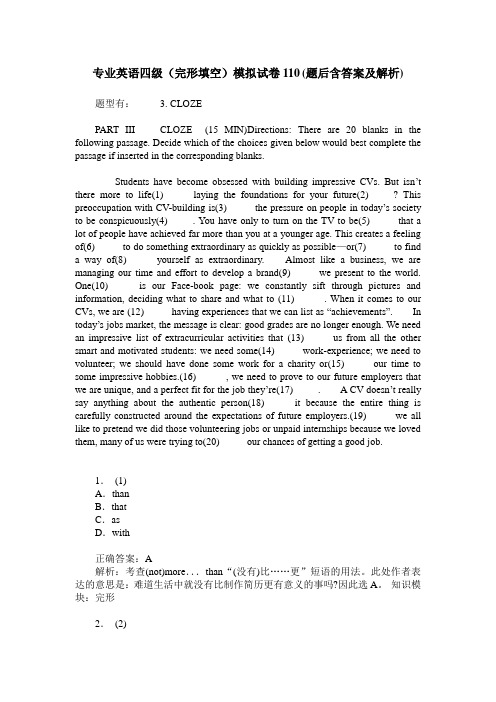
专业英语四级(完形填空)模拟试卷110(题后含答案及解析)题型有: 3. CLOZEPART III CLOZE (15 MIN)Directions: There are 20 blanks in the following passage. Decide which of the choices given below would best complete the passage if inserted in the corresponding blanks.Students have become obsessed with building impressive CVs. But isn’t there more to life(1)_____ laying the foundations for your future(2)_____? This preoccupation with CV-building is(3)_____ the pressure on people in today’s society to be conspicuously(4)_____. You have only to turn on the TV to be(5)_____ that a lot of people have achieved far more than you at a younger age. This creates a feeling of(6)_____ to do something extraordinary as quickly as possible—or(7)_____ to find a way of(8)_____ yourself as extraordinary. Almost like a business, we are managing our time and effort to develop a brand(9)_____ we present to the world. One(10)_____ is our Face-book page: we constantly sift through pictures and information, deciding what to share and what to (11)______. When it comes to our CVs, we are (12)_____ having experiences that we can list as “achievements”. In today’s jobs market, the message is clear: good grades are no longer enough. We need an impressive list of extracurricular activities that (13)_____ us from all the other smart and motivated students: we need some(14)_____ work-experience; we need to volunteer; we should have done some work for a charity or(15)_____ our time to some impressive hobbies.(16)______, we need to prove to our future employers that we are unique, and a perfect fit for the job they’re(17)_____. A CV doesn’t really say anything about the authentic person(18)_____ it because the entire thing is carefully constructed around the expectations of future employers.(19)_____ we all like to pretend we did those volunteering jobs or unpaid internships because we loved them, many of us were trying to(20)_____ our chances of getting a good job.1.(1)A.thanB.thatC.asD.with正确答案:A解析:考查(not)more...than“(没有)比……更”短语的用法。
专业英语四级(完形填空)模拟试卷150(题后含答案及解析)
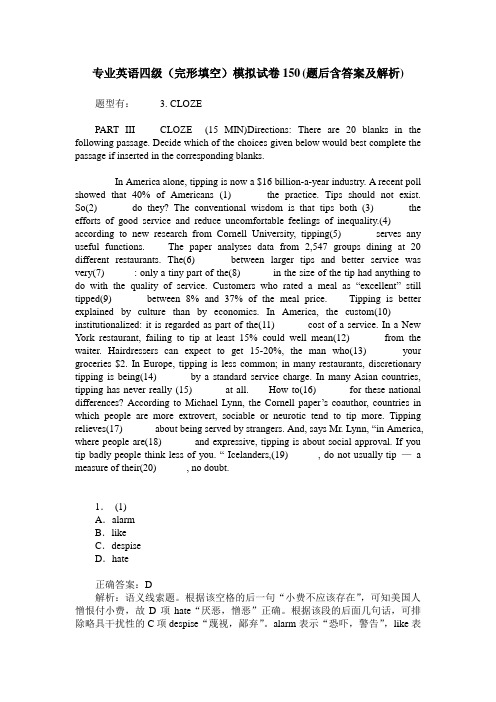
专业英语四级(完形填空)模拟试卷150(题后含答案及解析)题型有: 3. CLOZEPART III CLOZE (15 MIN)Directions: There are 20 blanks in the following passage. Decide which of the choices given below would best complete the passage if inserted in the corresponding blanks.In America alone, tipping is now a $16 billion-a-year industry. A recent poll showed that 40% of Americans (1)______ the practice. Tips should not exist. So(2)______ do they? The conventional wisdom is that tips both (3)______ the efforts of good service and reduce uncomfortable feelings of inequality.(4)______ according to new research from Cornell University, tipping(5)______ serves any useful functions. The paper analyses data from 2,547 groups dining at 20 different restaurants. The(6)______ between larger tips and better service was very(7)______: only a tiny part of the(8)______ in the size of the tip had anything to do with the quality of service. Customers who rated a meal as “excellent”still tipped(9)______ between 8% and 37% of the meal price. Tipping is better explained by culture than by economics. In America, the custom(10)______ institutionalized: it is regarded as part of the(11)______ cost of a service. In a New York restaurant, failing to tip at least 15% could well mean(12)______ from the waiter. Hairdressers can expect to get 15-20%, the man who(13)______ your groceries $2. In Europe, tipping is less common; in many restaurants, discretionary tipping is being(14)______ by a standard service charge. In many Asian countries, tipping has never really (15)______ at all. How to(16)______ for these national differences? According to Michael Lynn, the Cornell paper’s coauthor, countries in which people are more extrovert, sociable or neurotic tend to tip more. Tipping relieves(17)______ about being served by strangers. And, says Mr. Lynn, “in America, where people are(18)______ and expressive, tipping is about social approval. If you tip badly people think less of you. “ Icelanders,(19)______, do not usually tip —a measure of their(20)______, no doubt.1.(1)A.alarmB.likeC.despiseD.hate正确答案:D解析:语义线索题。
专业英语四级(完形填空)模拟试卷300(题后含答案及解析)

专业英语四级(完形填空)模拟试卷300(题后含答案及解析)题型有: 4. CLOZEPART IV CLOZEDecide which of the words given in the box below would best complete the passage if inserted in the corresponding blanks. The words can be used ONCE ONLY.A. absenceB. adaptationC. cushionsD. defineE. depressionF. distractingG. enlargesH. evolveI. economicalJ. instrumentalK. interpersonalL. occasionallyM. strengthenedN. tendencyO. typically Since we are social beings, the quality of our lives depends in large measure on our interpersonal relationships. One strength of the human condition is our 【C1】______ to give and receive support from one another under stressful circumstances. Social support consists of the exchange of resources among people based on their 【C2】______ ties. Those of us with strong support systems appear better able to treat with major life changes and daily hassles (日常困扰). People with strong social ties live longer and have better health than those without such ties. Studies over a range of illnesses, from 【C3】______ to heart disease, reveal that the presence of social support helps people fend off illness, and the 【C4】______ of such support makes poor health more likely. Social support 【C5】______ stress in a number of ways. First, friends, relatives, and co-workers may let us know that they value us. Our self-respect is 【C6】______ when we feel accepted by others despite our faults and difficulties. Second, other people often provide us with informational support. They help us to 【C7】______ and understand our problems and find solutions to them. Third, we 【C8】______ find social companionship supportive. Engaging in leisure-time activities with others helps us to meet our social needs while at the same time 【C9】______ us from our worries and troubles. Finally, other people may give us 【C10】______ support—financial aid, material resources, and needed services—that reduces stress by helping us resolve and cope with our problems.1.【C1】正确答案:N解析:形容词性物主代词our提示空格填入名词,且能后接不定式。
专业英语四级(完形填空)模拟试卷42(题后含答案及解析)
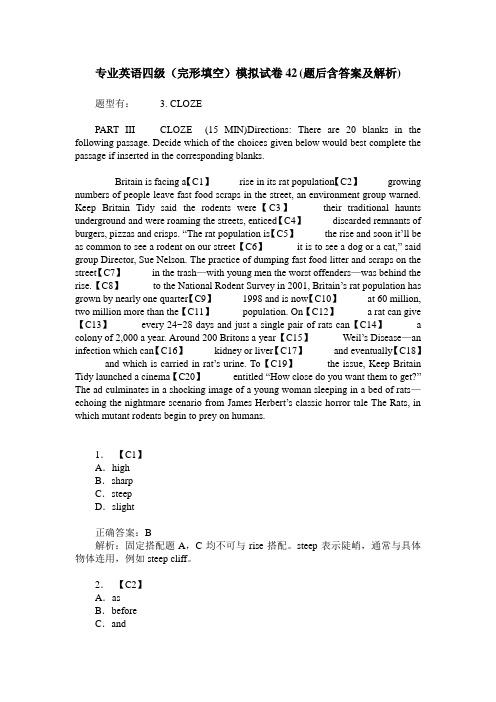
专业英语四级(完形填空)模拟试卷42(题后含答案及解析)题型有: 3. CLOZEPART III CLOZE (15 MIN)Directions: There are 20 blanks in the following passage. Decide which of the choices given below would best complete the passage if inserted in the corresponding blanks.Britain is facing a【C1】______rise in its rat population【C2】______growing numbers of people leave fast food scraps in the street, an environment group warned. Keep Britain Tidy said the rodents were【C3】______their traditional haunts underground and were roaming the streets, enticed【C4】______discarded remnants of burgers, pizzas and crisps. “The rat population is【C5】______the rise and soon it’ll be as common to see a rodent on our street【C6】______it is to see a dog or a cat,” said group Director, Sue Nelson. The practice of dumping fast food litter and scraps on the street【C7】______in the trash—with young men the worst offenders—was behind the rise.【C8】______to the National Rodent Survey in 2001, Britain’s rat population has grown by nearly one quarter【C9】______1998 and is now【C10】______at 60 million, two million more than the【C11】______population. On【C12】______a rat can give 【C13】______every 24~28 days and just a single pair of rats can【C14】______a colony of 2,000 a year. Around 200 Britons a year【C15】______Weil’s Disease—an infection which can【C16】______kidney or liver【C17】______and eventually【C18】______and which is carried in rat’s urine. To【C19】______the issue, Keep Britain Tidy launched a cinema【C20】______entitled “How close do you want them to get?”The ad culminates in a shocking image of a young woman sleeping in a bed of rats—echoing the nightmare scenario from James Herbert’s classic horror tale The Rats, in which mutant rodents begin to prey on humans.1.【C1】A.highB.sharpC.steepD.slight正确答案:B解析:固定搭配题A,C均不可与rise搭配。
专业英语四级(完形填空)模拟试卷128(题后含答案及解析)
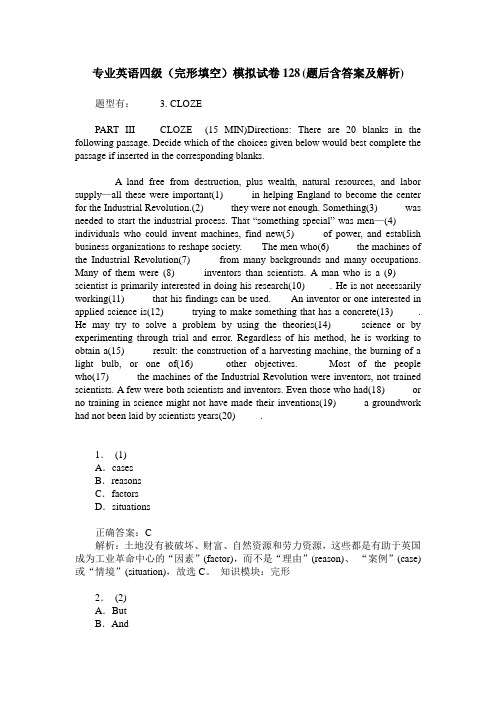
专业英语四级(完形填空)模拟试卷128(题后含答案及解析)题型有: 3. CLOZEPART III CLOZE (15 MIN)Directions: There are 20 blanks in the following passage. Decide which of the choices given below would best complete the passage if inserted in the corresponding blanks.A land free from destruction, plus wealth, natural resources, and labor supply—all these were important(1)_____ in helping England to become the center for the Industrial Revolution.(2)_____ they were not enough. Something(3)_____ was needed to start the industrial process. That “something special” was men—(4)_____ individuals who could invent machines, find new(5)_____ of power, and establish business organizations to reshape society. The men who(6)_____ the machines of the Industrial Revolution(7)_____ from many backgrounds and many occupations. Many of them were (8)_____ inventors than scientists. A man who is a (9)_____ scientist is primarily interested in doing his research(10)_____. He is not necessarily working(11)_____ that his findings can be used. An inventor or one interested in applied science is(12)_____ trying to make something that has a concrete(13)_____. He may try to solve a problem by using the theories(14)_____ science or by experimenting through trial and error. Regardless of his method, he is working to obtain a(15)_____ result: the construction of a harvesting machine, the burning of a light bulb, or one of(16)_____ other objectives. Most of the people who(17)_____ the machines of the Industrial Revolution were inventors, not trained scientists. A few were both scientists and inventors. Even those who had(18)_____ or no training in science might not have made their inventions(19)_____ a groundwork had not been laid by scientists years(20)_____.1.(1)A.casesB.reasonsC.factorsD.situations正确答案:C解析:土地没有被破坏、财富、自然资源和劳力资源,这些都是有助于英国成为工业革命中心的“因素”(factor),而不是“理由”(reason)、“案例”(case)或“情境”(situation),故选C。
- 1、下载文档前请自行甄别文档内容的完整性,平台不提供额外的编辑、内容补充、找答案等附加服务。
- 2、"仅部分预览"的文档,不可在线预览部分如存在完整性等问题,可反馈申请退款(可完整预览的文档不适用该条件!)。
- 3、如文档侵犯您的权益,请联系客服反馈,我们会尽快为您处理(人工客服工作时间:9:00-18:30)。
Flight simulator (飞行模拟器 refers to any electronic or mechanical system for training airplane and spacecraft pilots and crew member by simulating flight conditions. The purpose of simulation is not to completely substitute (1 actual flight training but to thoroughly familiarize students with the vehicle (2 before they (3 extensive and possibly dangerous actual flight training. Simulations also is useful for review and for familiarizing pilots with new (4 to existing craft. Two early flight simulators appeared in England within a decade after the first flight of Orville and Wilbur Wright. They were designed to enable pilots to simulate simple aircraft (5 in three dimensions, nose up or down; left wing high and right low, or vice versa; and (6 to left or right. It took until 1929, however , for a truly effective simulator, the Link Trainer, to appear, devised by Edwin A. Link, a self-educated aviator and inventor from Binghamton , New York. (7 airplane instrumentation had been developed sufficiently to permit "blind" flying on instruments alone, but training pilots to do so involved (8 risk. Link built a model of an airplane cockpit equipped (9 instrument panel and controls that could realistically simulate all the movements of an airplane. Pilots could use the device for instrument training, manipulating the controls (10 instrument readings so as to maintain straight and level flight or (11 climb or descent with no visual reference (12 any horizon except for the artificial one on the instrument panel. The trainer was modified (13 aircraft technology advanced. Commercial airlines began to use the Link Trainer for pilot training, and the US government began purchasing them in 1934, (14 thousands more as World War II approached.Technological advances during the war, particularly in electronics, helped to make the flight simulator increasingly (15 The use of efficient analog computers in the early 1950s led to further improvements. Airplane cockpits , controls , and instrument displays had by then become so inpidualized that it was no longer feasible to use a generalized trainer to prepare pilots to fly anything (16 the simplest light planes. By the 1950s , the US Air Force was using simulators that precisely (17 the cockpits of its planes. During the early 1960s (18 digital and hybrid computers were adopted , and their speed andflexibility revolutionized simulation systems. Further advances in computer and (19 technology , notably the development of virtual-reality simulation, have made it possible to (20 highly complex real-life conditions.1. A. forB. toC. withD. on2. A. concerningB. concernC. being concernedD. concerned3. A. undertakeB. undergoC. underplayD. underuse 4. A. modelsB. modificationsC. modifiersD. modica5. A. manifestationsB. manipulationsC. manifestoesD. maneuvers 6. A. yawlingB. yawningC. yawingD. yawping7. A. From then onB. From now onC. By nowD. By then8. A. considerableB. considerateC. consideringD. considered 9. A. forB. inC. withD. on10. A. on the part ofB. on the basis ofC. on the track ofD. on the verge of 11. A. controlB. controllableC. controlledD. controller 12. A. toB. forC. onD. in13. A. as forB. as toC. asD. for14. A. acquiring B. requiringC. sustainingD. retaining15. A. actualB. realisticC. realizingD. true16. A. exceptB. except forC. apart fromD. but17. A. replenishedB. replacedC. replicatedD. reposed18. A. electronicB. electricC. electricityD. electron19. A. programB. programmableC. programmedD. programming20. A. resurrectB. reproduceC. resuscitateD. resumeADBBD CDACB CACAB DCADBPainting, the execution of forms and shapes on a surface by means of pigment, has been continuously practiced by humans for some 20,000 years. Together with other activities (1_____ ritualistic in origin but have come to be designated as artistic (such as music or dance, painting was one of the earliest ways in which man (2_____ to express his own personality and his (3_____ understanding of an existence beyond the material world. (4_____ music and dance, however, examples of early forms of painting have survived to the present day. The modern eye can derive aesthetic as well as antiquarian satisfaction (5_____ the 15,000-year-old cave murals of Lascaux -- some examples(6_____ to the considerable powers of draftsmanship of these early artists. And painting, like other arts, exhibits universal qualities that (7_____ for viewers of all nations and civilizations to understand and appreciate.The major (8_____ examples of early painting anywhere in the world are found in Western Europe and the Soviet Union. But some 5,000 years ago, the areas in which important paintings were executed (9_____ to the eastern Mediterranean Sea and neighboring regions. (10_____, Western shared a European cultural tradition-- the Middle East and Mediterranean Basin and, later, the countries of the New World.Western painting is in general distinguished by its concentration (11_____ the representation of the human (12_____, whether in the heroic context of antiquity or the religious context of the early Christian and medieval world. The Renaissance (13_____ this tradition through a (14_____ examination of the natural world and an investigation of balance, harmony, and perspective in the visible world, linking painting (15_____ the developing sciences of anatomy and optics. The first real (16_____ from figurative painting came with the growth of landscape painting in the 17th and 18th centuries. Thelandscape and figurative traditions developed together in the 19th century in an atmosphere that was increasingly (17_____ "painterly" qualities of the (18_____ of light and color and the expressive qualities of paint handling. In the 20th century these interests (19_____ to the development of a third major tradition in Western painting, abstract painting, which sought to (20_____ and express the true nature of paint and painting through action and form. 1.A. may have beenB. that may haveC. may haveD. that may have been2.A. seekB. soughtC. seek forD. sought for3.A. emergingB. emergencyC. mergingD. merger4.A. AsB. UnlikeC. LikeD. Since5.A. fromB. toC. intoD. for6.A. ratifyB. testifyC. certifyD. gratify 7.A. make easyB. make it easyC. make hardD. make it hard 8.A. extinctB. extentC. extantD. exterior 9.A. had shiftedB. have shiftedC. shiftingD. shifted 10.A. NeverthelessB. MoreoverC. HoweverD. Therefore 11.A. toB. inC. onD. for12.A. figureB. shapeC. shadowD. form13.A. extractedB. extendedC. extortedD. extruded 14.A. closingB. closeC. closedD. closure15.A. onB. forC. inD. to16.A. breakB. breakageC. breakdownD. breaking 17.A. concerned withB. concerningC. concerning withD. concerned for 18.A. reactionB. actionC. interactionD. relation 19.A. distributedB. attributedC. contributedD. construed 20.A. discoverB. uncoverC. recoverD. cover1.D2. B3. A4. B5. A6. B7. B8. C9. D 10. D 11. C 12. A 13. B 14. B 15. D16. A 17. A 18. C 19. C 20. BAesthetic thought of a distinctively modern bent emerged during the 18th century. The western philosophers and critics of this time devoted much attention to such matters (1_____ natural beauty, the sublime, and representation -- a trend reflecting the central position they had given to the philosophy of nature. (2_____ that time, however, the philosophy of art has become ever more (3_____ and has begun to (4_____ the philosophy of nature. Various issues (5_____ to the philosophy of art have had a (6_____ impact (7_____ the orientation of 20th-century aesthetics. (8_____ among these are problems relating to the theory of art as form and (9_____ the distinction between representation and expression. Still another far-reaching question has to do with the value of art. Two opposing theoretical positions (10_____ on this issue: one holds that art and its appreciation are a means to some recognized moral good, (11_____ the other maintains that art is intrinsically valuable and is an end in itself. Underlying this whole issue is the concept of taste, one of the basic concerns of aesthetics. In recent years there has also been an increasing (12_____ with art as the prime object of critical judgment. Corresponding to the trend in contemporary aesthetic thought, (13_____ have followed (14_____ of two approaches. In one, criticism is restricted to the analysis and interpretation of the work of art. (15_____, it is devoted to articulating the response to the aesthetic object and to (16_____ a particular way of perceiving it.Over the years, aesthetics has developed into a broad field of knowledge and inquiry. The concerns of contemporary aesthetics include such (17_____ problems as the natureof style and its aesthetic significance; the relation of aesthetic judgment to culture; the (18_____ of a history of art; the (19_____ of Freudian psychology and other forms of psychological study to criticism; and the place of aesthetic judgment in practical(20_____ in the conduct of everyday affairs.1.A. forB. asC. toD. with2.A. SinceB. ForC. As3.A. promotionalB. promissoryC. promiscuousD. prominent 4.A. plantB. supplantC. transplantD. replant 5.A. centralB. concentratingC. focusingD. centering 6.A. markingB. remarkingC. markedD. remarked 7.A. onB. forC. inD. to8.A. ForebodyingB. ForemostC. ForethoughtfulD. Foregone 9.A. forB. forC. toD. onA. have broughtB. have been broughtC. have takenD. have been taken 11.A. whereasB. whereinC. whereonD. wherefore12.A. preoccupancyB. preoccupationC. premonitionD. preoption13.A. artistsB. writersC. criticsD. analysts14.A. allB. eitherC. neitherD. none15.A. In the other mannerB. In the other wayC. In anotherD. In the other16.A. justifyB. justifiedC. justifyingD. having justified 17.A. diverseB. dividedC. divineD. dividual18.A. vicinityB. viabilityC. villainyD. visibility19.A. relianceB. reliabilityC. reliefD. relevancy20.A. reasonB. reasonablenessC. reasoningD. reasonability1. B2. A3. D4. B5. A6. C7. A8. B9. C 10. D 11. A 12. B 13. C 14. B 15. D 16.C 17. A 18. B 19.D 20. C。
